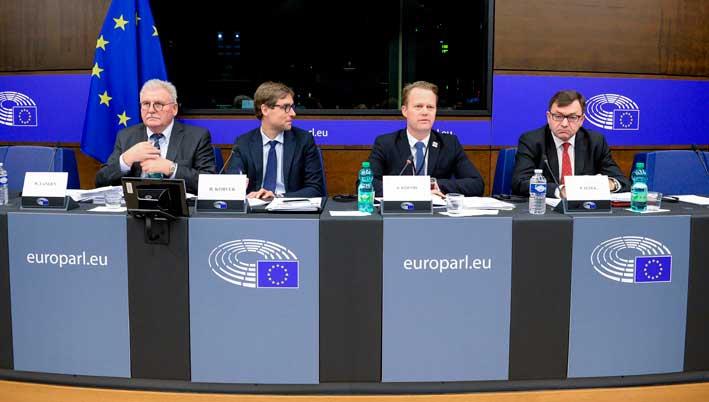The recent liberalisation of the Maltese energy market is the result of ‘dirty money’, the European Parliament's PANA committee chairman Werner Langen told journalists at roundtable meeting, while also saying that he was hopeful that written proof over his allegations would emerge.
Under the Labour government, a consortium made up of local businessmen, Siemens and the state-owned Azerbaijani energy company Socar were granted the bid to build a new-gas based power plant; while state-owned Chinese energy company Shanghai Electric power acquired a 33% stake in Enemalta and took over the former BWSC power plant.
The 25% tax rebate granted to foreign commercial entities meant that they effectively pay a 5% tax rate, he said.
Langen explained that the issues plaguing the country was a systemic issue and this was not pertaining to the present government alone. He said this was brought about by the number of exemptions granted to the island when it ascended to the EU in 2004.
The PANA committee, he said, would increase monitoring in Malta, and could potentially seek to suspend its voting rights through Article 7.

Earlier
PANA Report rapporteur Jeppe Kofod today called for the introduction of a minimum corporate tax rate, to stop “the sick race to the bottom on taxation and regulation”, while also lamenting the serious lack of sincere cooperation between the EP and council when compiling the report.
This was echoed by the Commissioner Pierre Moscovici who agreed with the report’s proposal to move from unanimous voting to absolute majority within the council.
Kofod’s fellow rapporteur, Petr Jezek, said that he believed that Malta, which was mentioned several times throughout the debate, was not a tax haven but was not cooperative in the fight against tax evasion and avoidance.
Speaking at the final debate before a vote on the PANA report on the inquiry into money laundering, tax avoidance and tax evasion, Kofod said that the Panama Papers revealed a "global network of the corrupt elite, including politicians, celebrities, and corporate leaders.”
“These people believe that they are above tax law and the law in general. They use opaque structures to facilitate money laundering and tax evasion. All of this is detrimental to democracy and trust in society,” Kofod said.

He said that the conclusion of the report made it clear that member states appear to be reluctant to implement EU legislation on the subject, specifically the money laundering directive, which is yet to be enforced by Malta.
Kofod called for the introduction of a minimum corporate tax rate, to stop “the sick race to the bottom on taxation and regulation.”
He said that the EU needed to open its doors to transparency in money laundering and corporate tax specifically through the introduction of a public registry of UBOs, a tax-branch within Europol, harsher sanctions against tax secrecy, and better protection of whistleblowers.
“We need to stop looking to journalists to the job parliamentarians are supposed to do.”
Pointing to the recently published list of tax havens, he said that while it omitted EU member states, it was vital that the institutions ensured that four countries in particular (Malta, Ireland, Luxembourg and the Netherlands) would begin to fulfil the highest standards.
He closed by ominously saying that he looked forward to seeing which way certain MEPs will vote on this report.
Malta not tax haven, but not cooperative in fight against tax evasion - Petr Jezek
Petr Jezek said that the Panama Papers reveal is global proof of the paramount importance of traditional journalists in times of disinformation campaigns.
He expressed concerns that the list of tax havens was not expanded to the EU countries as some expected, but said that these were the first important steps and called for greater regulation when it came to working with such states.
“I will not go as far to say that Malta and Ireland are tax havens, but they are not cooperative or helpful in the fight against tax evasion and tax avoidance."
“Those left behind by globalisation, see the behaviour of the wealthy as evidence of the injustice in the world."
‘The imagination of these fraudsters is endless’ - Commissioner Pierre Moscovici
European Commissioner for Economic and Financial Affairs, Taxation and Customs Pierre Moscovici stressed that while the PANA report was concluding, it was essential to build on the momentum created throughout the last few years.
“You are in full support of the commission. The work will never stop, we need to relentless, the imagination of these fraudsters is endless,” Moscovici said.
He praised the recent shift from secrecy to transparency, to more cooperation and collaboration between member states.
Moscovici went on to insist that greater automatic exchange of information will only strengthen the fight against these tax structures, and is the keystone to all these reforms.
He said that while EU counties were not included in the blacklist, the commission still has serious concerns over some member states.
“We need to strengthen the FIAU departments through resources and personnel. We need to look more at the role intermediaries are playing, and we need ensure that intermediaries declare the specifics of their tax systems to states.”
Mentioning Malta, Luxembourg, Ireland, and the Netherlands specifically, Moscovini said that the EU needed to be more rigours and strict.
MEP Ana Gomes was faced with questions concerning Portugal’s (though Madeira) and other small nations tax systems during her intervention in parliament.
“It does not make a difference if you are a small country, and this is the way you wish to make money. This is a crime, and the commission has a responsibility to take action.”